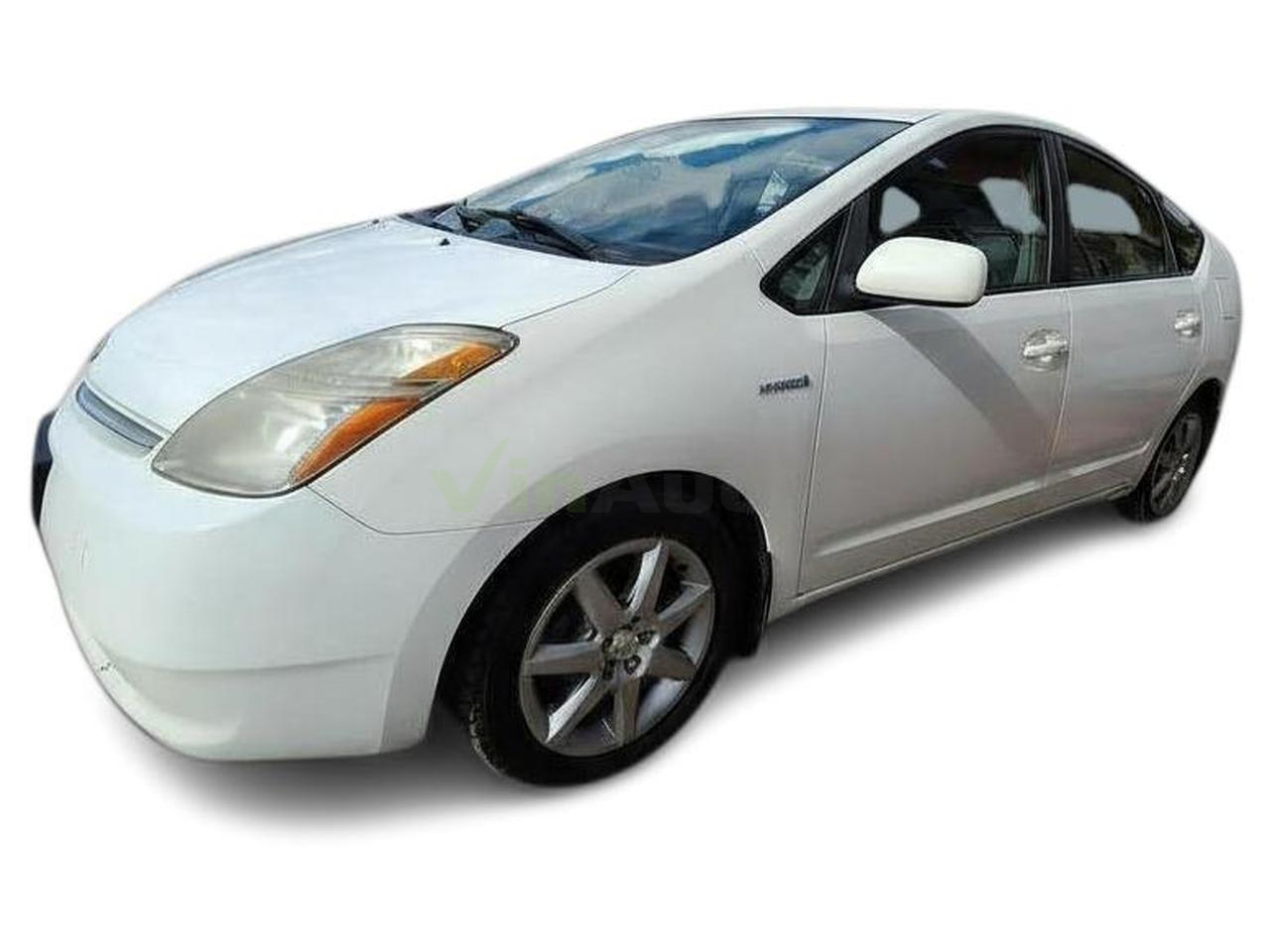The Good
The 2008 Toyota Prius excels with its phenomenal fuel efficiency, delivering substantial savings at the pump, a practical appeal. Its proven reliability and low emissions foster a sense of environmental responsibility, an emotional draw. Owners appreciate the smooth, quiet ride, surprising interior space, and strong resale value, combining both comfort and financial wisdom.
The Bad
Known weaknesses for the 2008 Prius include somewhat modest acceleration and less engaging driving dynamics. More critically, potential hybrid battery degradation is a significant long-term concern, as are possible failures of the brake actuator and the multi-function display screen, which can be expensive repairs.
2008 Toyota Prius: Quick Overview
The 2008 Toyota Prius, being a dedicated hybrid, offered a single, highly efficient powertrain configuration, focusing on fuel economy over raw performance.
- Engine: It features Toyota's Hybrid Synergy Drive system, which combines a 1.5-liter Atkinson-cycle 4-cylinder gasoline engine with an electric motor.
- Horsepower: The gasoline engine produces 76 hp and 82 lb-ft of torque. The electric motor contributes 67 hp and 295 lb-ft of torque. The combined net system output is rated at 110 horsepower.
- Fuel Economy: EPA estimates were impressive, rated at approximately 48 MPG in the city, 45 MPG on the highway, and 46 MPG combined.
- 0-60 MPH: Acceleration from 0 to 60 mph was leisurely, typically taking around 10.0 to 10.5 seconds, reflecting its efficiency-first design.
- Towing Capacity: The 2008 Toyota Prius is not officially rated or recommended for towing by the manufacturer, consistent with most vehicles in its class and hybrid powertrains.
- Trim-Level Features: Rather than distinct trim levels, the Prius was generally offered with a base model and several upgrade packages (often referred to as Packages 1 through 5, though naming varied slightly).
- Base Model: Standard features included automatic climate control, power windows, power door locks, power mirrors, a tilt steering wheel, a six-speaker CD stereo system, and anti-lock brakes (ABS).
- Upgrade Packages (e.g., Package 2-5): These progressively added more premium features. Common optional additions included the Smart Key system (allowing keyless entry and starting), Vehicle Stability Control (VSC) and traction control, cruise control, fog lamps, high-intensity discharge (HID) headlamps, a navigation system with a touch-screen display, Bluetooth connectivity for hands-free phone use, a premium JBL audio system with a 6-disc CD changer, steering wheel-mounted audio controls, and a backup camera. Leather-trimmed steering wheel and shifter were also available in higher packages, enhancing interior comfort and convenience.
2008 Toyota Prius Specifications
Vehicle Information
| Year | 2008 |
| Make | Toyota |
| Model | Prius |
| Trim | - |
| Style | 5-Door |
| Type | Hatchback |
| Category | Mid-Size Car |
Manufacturing Details
| Made In | Japan |
| Manufacturing City | KARIYA |
Dimensions
| Doors | 5-Door |
| Curb Weight | 1329.93 kg |
| Gross Vehicle Weight Rating | - |
| Overall Height | 149.1 cm |
| Overall Length | 444.5 cm |
| Overall Width | 172.47 cm |
| Wheelbase Length | 270 cm |
| Standard Seating | 5 |
Engine & Performance
| Engine | 1.5L I4 |
| Engine Size | 1.5L |
| Engine Cylinders | 4 |
| Transmission | Automatic |
| Transmission Type | Automatic |
| Transmission Speeds | Continuously Variable |
| Drivetrain | Front-Wheel Drive |
Additional Features
| Anti-Brake System | 4-Wheel ABS |
| Steering Type | Rack & Pinion |
Pricing
| Manufacturer Suggested Retail Price (MSRP) | $23,370 USD |
| Invoice Price | $21,447 USD |
| Delivery Charges | $660 USD |
Vehicle History Report
Specifications
History
Events
History Check
Check
Check
Check
Check
Listings
Recalls
Check
Analysis
What Problems Does the 2008 Toyota Prius Have?
Another common and costly issue is the potential failure of the ABS brake actuator assembly. Symptoms include dashboard warning lights (ABS, VSC, BRAKE, etc.) and sometimes a noticeable change in brake feel. This repair can be quite expensive, often ranging from $1,500 to $3,000 or more, and is a known weak point in many second-generation Prius models, including the 2008.
The Multi-Function Display (MFD) screen, which controls climate, audio, and energy monitoring, is prone to dimming or completely failing. While not a safety issue, it severely impacts user interface and comfort. Replacement units or repair services are available, but it's another common repair for aging units.
Other reported issues include premature failure of 12V auxiliary batteries (which powers the car's conventional electronics), occasional oil consumption in the 1.5L engine at higher mileages, and issues with headlight bulbs (especially HID units) and their ballasts burning out.
Regarding recalls, the 2008 Prius was part of a broader Toyota recall related to accelerator pedal entanglement with floor mats. Owners should always check the NHTSA website using their VIN for any outstanding safety recalls specific to their vehicle. While the Gen 2 Prius is robust, these specific components represent the main long-term reliability concerns that potential buyers should be aware of and budget for.
How long will the 2008 Toyota Prius last?
However, this impressive lifespan hinges on specific maintenance and acknowledges certain weaknesses over time. The primary concern is the hybrid battery, typically lasting 8-12 years or 150,000-200,000 miles before needing replacement or reconditioning. The ABS brake actuator and the Multi-Function Display screen also show age-related failures. Consistent fluid changes (engine oil, transmission fluid, hybrid inverter coolant) and timely preventative maintenance are crucial for maximizing the vehicle's lifespan and mitigating these known aging issues.
What Technology & Safety Features are Included?
For entertainment, a standard CD player was provided, often with an auxiliary input jack for external devices in later models or specific packages. Optional upgrades included a premium JBL audio system, sometimes with a 6-disc in-dash CD changer, and steering wheel-mounted audio controls. Higher-tier packages also offered a voice-activated navigation system and Bluetooth hands-free phone connectivity.
Driver-assistance features, while not as comprehensive as modern vehicles, included standard Anti-lock Brakes (ABS) with Electronic Brake-force Distribution (EBD) and Brake Assist (BA). Optional, but highly recommended, were Vehicle Stability Control (VSC) and Traction Control (TRAC), which significantly enhanced vehicle control in slippery conditions. The Smart Key system, an optional feature, allowed for keyless entry and push-button start, adding a layer of convenience.
Safety was a strong suit, with a comprehensive airbag system including dual front airbags, front side-impact airbags, and full-length side curtain airbags as standard. The aforementioned ABS, EBD, and BA were also standard safety nets.
Crash Test Ratings:
- NHTSA (National Highway Traffic Safety Administration):
- Frontal Crash Test (Driver): 5 out of 5 stars
- Frontal Crash Test (Passenger): 4 out of 5 stars
- Side Crash Test (Front Seat): 5 out of 5 stars
- Side Crash Test (Rear Seat): 5 out of 5 stars
- Rollover Resistance: 4 out of 5 stars
- IIHS (Insurance Institute for Highway Safety):
- Moderate Overlap Front: "Good"
- Side Impact: "Good" (with side airbags)
- Roof Strength: "Good"
- Rear Crash Protection/Head Restraints: "Good"
What Colors Options are Available?
2008 Toyota Prius Prices and Market Value
Initially, the Prius held its value remarkably well due to high demand for fuel-efficient vehicles. However, older hybrids face steeper depreciation as the lifespan of their expensive hybrid battery becomes a major concern. Factors severely affecting current resale value include high mileage, visible wear and tear, and especially, an aging or failing hybrid battery. A documented recent hybrid battery replacement or reconditioning can significantly boost resale value, making the car a much more attractive proposition to a prospective buyer.
2008 Toyota Prius Cost of Ownership
2008 Toyota Prius Fuel Efficiency
2008 Toyota Prius Safety Rating
NHTSA
IIHS
2008 Toyota Prius Warranty
Basic
Powertrain
Rust
2008 Toyota Prius Insurance
reasonable repair costs.
How Does the 2008 Toyota Prius Compare to Other Hatchback?
In terms of Performance, the Prius is noticeably less powerful and offers a softer, less engaging driving experience compared to the Civic Hybrid, which often felt a bit more nimble, or any conventional compact. Its 0-60 mph time is slower, prioritizing economy over acceleration. The Civic Hybrid's Integrated Motor Assist (IMA) system also behaved differently, with less capability for all-electric driving at low speeds.
Features-wise, the Prius excelled with its integrated Multi-Function Display (MFD) offering a comprehensive interface for climate, audio, and energy flow. Optional features like voice-activated navigation, JBL sound, and the Smart Key system were competitive, if not class-leading, at the time. The Civic Hybrid offered similar amenities but often within a more traditional dashboard layout.
Reliability is a strong suit for both Toyota and Honda. The Prius benefits from Toyota's robust powertrain reputation, though the hybrid battery remains its main long-term vulnerability. Honda's IMA system also had good reliability but sometimes faced its own battery degradation issues, along with potential CVT transmission concerns. Conventional Corolla and Civic models typically boast excellent long-term reliability with fewer complex systems.
Regarding Price, when new, the Prius often commanded a slight premium due to its superior fuel economy. In the used market today, the Prius can be found at very affordable prices, often dictated by the health of its hybrid battery. Comparable conventional compacts from the same era might be slightly cheaper upfront but lack the Prius's fuel efficiency.
Alternatives:
- Newer Toyota Prius (Gen 3, 2010+): Offers improved performance, better tech, and higher MPG, but still carries the long-term risk of hybrid battery and inverter issues.
- Toyota Corolla/Honda Civic (Conventional): If the absolute highest MPG isn't paramount, these offer simpler, often less costly long-term ownership due to fewer complex hybrid components. They are known for exceptional reliability and good fuel economy.
- Honda Civic Hybrid (2006-2011): A direct competitor, offering similar fuel economy and a slightly sportier feel, but with its own set of hybrid system nuances and potential battery issues.
- Ford Fusion Hybrid (Later models): While larger, it offers a more refined driving experience and competitive fuel economy for a mid-size sedan, often a better all-around package if space and comfort are priorities over compact size.
Final Verdict: Is the 2008 Toyota Prius a Good Hatchback?
As a used vehicle, a thorough pre-purchase inspection focusing on the hybrid battery's health, the brake actuator, and the Multi-Function Display is absolutely critical. Buyers should factor in the potential cost of a hybrid battery replacement or reconditioning (typically $1,500-$3,000+) within their ownership period. A Prius with a recently replaced or reconditioned battery offers excellent value. While "trims" aren't distinct, higher-optioned packages provide a more comfortable experience. If these major components are healthy or have been addressed, the 2008 Prius remains a very economical and reliable choice for its segment, delivering unparalleled MPG for its age. Without this due diligence, it could quickly become a costly ownership proposition.

